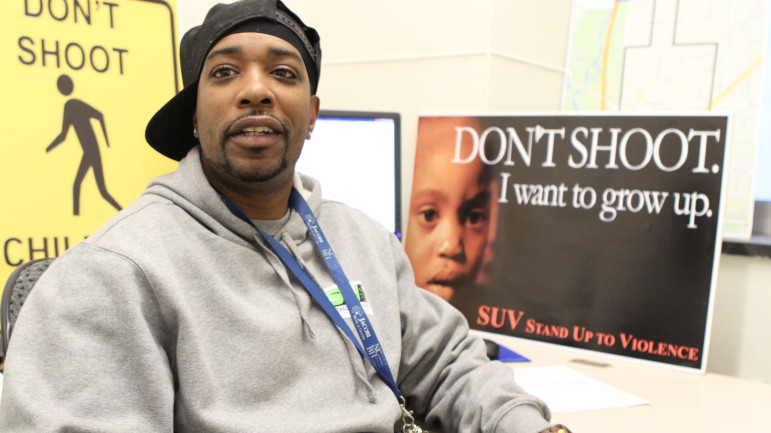
Michaela Ross
Stand Up to Violence counselor Mervin Moore says clients need to be made to feel they are family.
Mervin Moore is not a doctor. But he sees every shooting, stabbing and assault victim who comes through Jacobi Medical Center’s trauma ward in the Bronx.
“We deal with street violence,” Moore said. “It is a disease. And we are the cure.”
Moore works for Stand Up to Violence, an anti-violence program operated by Jacobi Medical Center. Launched in August, the program’s staff mentors victims of violence in Jacobi’s trauma ward. The goal is to prevent retaliation attacks by treating violence like a disease that spreads from perpetrator to victim.
The staff also reaches out to other area young adults at a high risk of committing violent crime and links them to resources like job training and education. People involved say the program works because the approach is personal: Moore and other SUV staff are ex-prisoners who can relate to participants.
Dr. Noe Romo, a pediatrician who serves as SUV’s medical director, said for years Jacobi’s doctors have wanted to do more than treat the physical injuries of violent crime victims.
“We really weren’t doing much for them besides taking care of their wounds acutely,” Romo said.
So in 2013, Jacobi applied for grant funding secured by state Sen. Jeffrey Klein to launch a Bronx-based version of the national anti-violence model Cure Violence. The model, first launched in Chicago, developed the concept that violence is like a disease.
Joe Thompson, a former NYPD officer who also serves on Stand Up to Violence’s advisory board, said he’s seen first hand how retaliation violence spreads.
“The next thing you know Charlie shoots Tim, Jimmy shoots Charlie’s brother, and then there’s all out war,” he said.
Thompson said SUV’s board spent months interviewing dozens of candidates to hire the program’s staff. He said the individuals chosen had to have “street cred” but also prove they had turned their lives around.
“We’re not hiring angels. We’re hiring people who can get this job done,” said Thompson, who is also president of the 49th Precinct community council.
John Doyle, a Jacobi spokesperson who helped launch the program, said SUV targets young men and women ages 16 to 24 who are involved in gangs or have recently been incarcerated or involved in a violent incident.
“These are not at-risk kids, they’re high-risk kids,” Doyle said.
Mervin Moore, an SUV employee, said he and the rest of the staff enroll young people either while canvassing their neighborhoods or when they’re in the trauma center. He said they stop the spread of violence through personal mentorship.
“You basically attack it at the root,” Moore said. “You send individuals like us who live in the neighborhoods and who have the influence.”
Roberto Rodriguez, another an SUV employee, said the staff often knows program participants because they live in the same neighborhoods. The initiative targets several housing projects and the areas around White Plains and Gun Hill roads.
“I think the participants can sense that I can trust this person, I can relate to this person,” Rodriguez said.
Once enrolled, participants ask for support from SUV staff depending on what they think they need to turn their lives away from violence, said Erika Mendelsohn, a Jacobi social worker and SUV’s director.
“If the participant is interested in a job program or education or mental health or substance abuse, then it’s our staff’s job to help them navigate those different programs and get them enrolled,” Mendelsohn said.
Mendelsohn said the staff’s success comes from their ability to personally relate to participants. She said even in Jacobi’s trauma ward, SUV employees like Moore get violence victims to open up.
“You can tell after he’s spoken with them how much more relaxed they are,” she said. “They have this level of support they weren’t getting when it was just medical staff speaking with them.”
Moore said participants have given the program good reviews, but it’s their parents who express the most gratitude.
“They say ‘You are probably the only person that I could’ve found to speak to my son,'” Moore recounted. “‘He looks up to you, and I like what you guys do here.'”
Moore said he can relate: he has kept himself out of prison after deciding several years ago he wanted to see his 12-year-old son grow up. Now, he said he tries to make his patients feel like family.
“I want them to understand that they got somebody that cares for them,” Moore said.









2 thoughts on “Bronx Program Treats Street Violence Like a Disease”
Pingback: Combating Assault Just Like an Disorder | LaResistenciaDigital.Net
This whole article should be removed, I completely support all the other persons that truly care about making a difference but Mervin Joseph Moore is the same individual that shot and killed my uncle in august of 2020 at a playground full of children and their families he clearly doesn’t have any regards to gun violence or the safety of others in general and should be held accountable for his actions in every way, he worked in a hospital seeing families grieve over gun violence and left work and became apart of the “disease”.